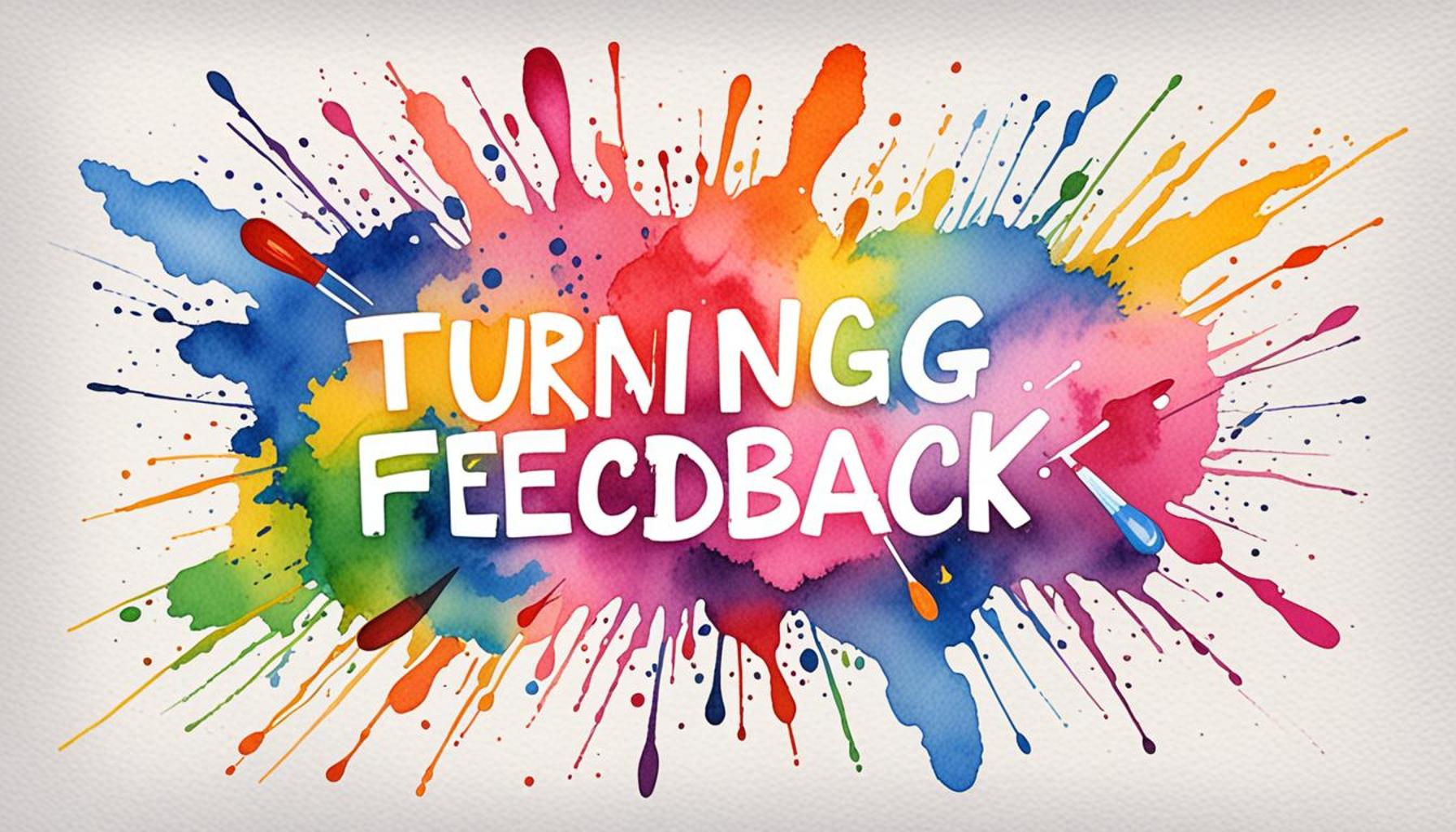The Art of Asking for Feedback: Strategies to Maximize Learning and Personal Growth

Understanding the Power of Feedback
In today’s fast-paced environment, the significance of feedback cannot be understated. It acts as a mirror, reflecting our strengths and weaknesses, and ultimately guiding us on our journey towards improvement. However, for many, especially in cultures where direct confrontation or criticism is seen as uncomfortable, the act of seeking feedback can often seem intimidating. Despite this challenge, harnessing feedback effectively can lead to transformative personal and professional growth.
Reasons Why Feedback is Essential
There are numerous compelling reasons to embrace feedback as a cornerstone of development.
- Improves Performance: Constructive criticism is invaluable as it illuminates specific areas where one can enhance their skills or performance. For example, in a Nigerian workplace, a supervisor offering feedback on presentation skills can lead to more effective communication during business meetings, thereby boosting one’s confidence and capabilities.
- Fosters Relationships: Actively seeking out opinions encourages open dialogue. By inviting feedback, individuals signal their value for others’ perspectives, which fosters trust and collaboration. This is particularly important in Nigeria’s diverse cultural landscape, where relationships are key to successful business interactions.
- Encourages Self-Reflection: Regular feedback encourages introspection, allowing individuals to pause and assess their own skills and progression. For instance, a student may seek feedback from a teacher not just to improve grades, but to understand their unique strengths and areas for development in their educational journey.
Embracing Feedback in Nigerian Contexts
In Nigeria, where the blending of diverse perspectives shapes both business and social environments, mastering the skill of requesting feedback can significantly enhance one’s experiences. A small business owner may benefit from customer feedback on their product or service, ultimately refining their offerings based on specific, actionable insights. Moreover, informal channels such as family discussions can also serve as platforms for constructive feedback that supports individual aspirations.
Strategies for Soliciting Feedback
To truly unlock the full potential of feedback, it is important to adopt effective strategies that make the process rewarding. Understanding when to ask for feedback is crucial—timing can dictate how the advice is received. The approach taken to ask for feedback is equally important; framing inquiries in a way that encourages openness can lead to richer dialogue. Specificity in what areas one seeks feedback is also essential; rather than asking a vaguely worded question, targeting a particular aspect such as leadership style or project management can yield more useful insights.
In conclusion, by implementing strategies to solicit feedback, individuals can not only refine their skills but also nurture a culture of continuous learning. In the vibrant and dynamic environment of Nigeria, where collaboration and innovation are increasingly valued, mastering the feedback loop can be a game-changer in both personal and professional realms. Embrace the opportunity to grow, learn, and evolve by integrating feedback into your routine.

YOU MAY ALSO LIKE: Read read another article
Effective Strategies to Solicit Feedback
To ignite the transformative power of feedback, it is essential to embrace effective strategies that ensure the process remains constructive and enriching. The way we approach feedback can significantly influence the quality of insights received. Here are some key strategies that individuals can adopt to enhance their experience in soliciting feedback, particularly in the diverse and vibrant Nigerian context.
1. Choose the Right Moment
Timing is everything when it comes to requesting feedback. Finding an appropriate moment when the other party is not preoccupied can lead to more meaningful conversations. This may involve requesting feedback after a significant event, such as completing a project or after a presentation. For instance, a student may seek a teacher’s evaluation immediately after a class project, ensuring that the feedback is fresh and relevant.
2. Frame Questions Thoughtfully
The way questions are framed can significantly impact the responses received. Instead of posing broad inquiries, be specific about the areas in which you seek guidance. For example, instead of asking, “What do you think of my performance?” consider asking, “How can I improve my leadership skills during group projects?” This targeted approach not only provides clearer insights but also shows the person giving feedback that you value their input.
3. Cultivate a Safe Environment
Creating a space where individuals feel comfortable sharing their thoughts is crucial. In many Nigerian settings, especially where hierarchy is significant, people may hesitate to voice their opinions openly. Encouraging feedback as a routine part of communication can help. For example, a manager might initiate a feedback session by highlighting the team members’ strengths, leading to a more balanced and willing discussion. This approach sets a positive tone, enabling team members to be more forthcoming with their perspectives.
4. Show Appreciation for Feedback
Whether the feedback received is positive or constructive, it is important to express gratitude. Acknowledging the effort someone takes to provide feedback fosters goodwill and encourages future exchanges. Simple phrases like, “Thank you for your insights,” or “I appreciate your honesty” can go a long way in building a culture of open communication and continuous improvement.
5. Act on the Feedback
One of the most powerful ways to demonstrate the value of feedback is to implement changes based on the insights received. By incorporating suggestions, individuals not only show that they respect the opinions of others but also take proactive steps towards personal growth. For instance, if a colleague advises on enhancing negotiation skills, actively rehearsing and practicing these techniques can yield remarkable results in both professional and personal interactions.
In conclusion, mastering the art of asking for feedback involves a commitment to being open, specific, and appreciative. By applying these strategies, individuals can create a feedback-friendly atmosphere that cultivates learning and personal development in the Nigerian context, where relationships and communication remain at the forefront of achieving success. Embracing feedback not just as criticism but as a crucial tool for growth can lead to profound advancements in one’s journey towards self-improvement.
The Importance of Cultivating a Feedback Culture
In today’s fast-paced world, the ability to adapt and grow is essential for both personal and professional success. Asking for feedback is a powerful tool that not only aids in self-improvement but also fosters a culture of openness and collaboration. Building such an environment can significantly enhance learning outcomes and encourage a willingness to share insights.
Creating Safe Spaces for Honest Communication
Establishing trust is the foundation of effective feedback. When individuals feel safe to express their thoughts and ideas, they are more likely to provide valuable insights that others might overlook. Employing techniques like active listening and expressing gratitude for input fosters this safe space, enabling a richer dialogue that can lead to profound understanding and personal growth.
Utilizing Feedback for Goal Setting
Feedback is not merely an evaluative tool; it is a vital component in setting realistic and attainable goals. By integrating constructive criticism into the goal-setting process, individuals can create clear objectives that align with their personal and professional aspirations. This strategy translates abstract ambitions into tangible milestones, making the path toward success more navigable.
| Feedback Strategies | Advantages |
|---|---|
| Understanding Perspectives | Encourages diverse insights and promotes empathy. |
| Encouraging Open Dialogue | Fosters a collaborative and innovative work environment. |
Applying Feedback in Real Time
Implementing real-time feedback can enhance learning experiences by allowing individuals to adjust their approaches immediately. This method not only accelerates personal growth but also cultivates a culture of continuous improvement, making it easier for everyone involved to thrive.
ADDITIONAL INSIGHTS: Expand your understanding here
Feedback Through Collaboration and Relationship Building
In the quest for personal growth and enhanced learning, feedback is not merely a one-way street; it thrives on collaboration and the strengthening of relationships. In Nigeria, where community and social bonds are deeply ingrained, leveraging interpersonal connections can significantly enrich the feedback process. Here are strategies to utilize collaboration and relationship-building as tools for effective feedback.
1. Leverage Peer Feedback
Peer feedback can prove to be an invaluable resource, particularly in academic and professional environments. Engaging with colleagues or classmates to form feedback groups allows individuals to share insights and perspectives in a collaborative atmosphere. For example, a group of university students working on a project can schedule regular meetings to critique each other’s contributions. This not only fosters a sense of shared responsibility but also encourages students to receive constructive criticism without the fear of judgment. The open exchange inherently enriches the learning experience and builds camaraderie among peers, which is vital in Nigerian culture.
2. The Role of Mentorship
Mentorship can play a pivotal role in cultivating a feedback-rich environment. Establishing a relationship with a mentor—be it a teacher, an experienced colleague, or a community leader—can facilitate ongoing dialogue about personal and professional growth. Mentors can provide invaluable insights based on their experiences, and their guidance often carries more weight due to established trust. For example, a junior lawyer may solicit feedback from a senior partner about courtroom performance, yielding indispensable insights that could shape their future practice. Embracing mentorship in Nigerian contexts allows individuals to navigate their careers with support, effectively maximizing their feedback opportunities.
3. Utilize Digital Platforms
In today’s digital age, technology can bridge the gap in communication and enable feedback across vast distances. Utilizing platforms such as Google Docs for collaborative projects or WhatsApp groups for ongoing discussions allows individuals to solicit and exchange feedback in real-time. Digital tools can enhance accessibility, particularly in Nigeria where geographical distribution can pose challenges. Online surveys and feedback forms can also facilitate anonymous responses, enabling more candid feedback and creating a comfortable environment for contributors. Engaging with digital tools empowers individuals to keep track of feedback over time, providing a holistic view of personal development.
4. Reflect on Feedback Received
Soliciting feedback is just the beginning; reflecting on the feedback received is equally important. After collecting insights, individuals should take the time to analyze and understand the implications of this feedback. Creating a journal to document feedback and personal reflections can assist in recognizing patterns and identifying areas of growth. For instance, if multiple sources indicate that a person’s communication skills require improvement, this reflection may prompt focused efforts to enhance those skills through workshops or public speaking events. This ongoing cycle of feedback and reflection cultivates a more profound sense of self-awareness and accountability.
5. Foster an Open Dialogue Culture
Creating a culture of open dialogue within organizations and learning environments is essential to the feedback process. Encouraging discussions about feedback not only demystifies its purpose but also normalizes it as a valuable practice. In Nigeria, where respect for authority may hinder open exchanges, cultivating an inclusive dialogue helps to break down barriers and foster an environment of trust. Emphasizing the intent behind feedback—growth and improvement—can help dispel apprehensions and encourage authentic conversations. This cultural shift is crucial for nurturing a community where feedback is seen as a positive driver of collective progress.
Through collaboration, mentorship, technology, and a culture of open dialogue, individuals can optimize their feedback experiences. As the Nigerian landscape continues to evolve, these practices will resonate profoundly, paving the way for enhanced learning and continued personal growth.
LEARN MORE: This related article may interest you
Conclusion
In the complex journey of personal growth and continuous learning, mastering the art of asking for feedback emerges as a powerful tool. The strategies discussed reflect the multifaceted nature of feedback, emphasizing the importance of collaboration, relationship-building, and self-reflection. By actively engaging with peers and mentors, individuals can cultivate an enriching environment that fosters constructive dialogue and enhances the feedback experience.
In Nigeria, where communal bonds are a cornerstone of society, harnessing the collective wisdom of networks can significantly elevate personal and professional development. Leveraging digital platforms not only broadens access to feedback but also encourages more inclusive participation, allowing diverse perspectives to be heard in real-time. It’s crucial to remember that feedback is not an endpoint, but rather a catalyst for self-improvement and deeper understanding.
As individuals reflect on the feedback they receive, they initiate a process of self-discovery that can lead to remarkable insights and actionable growth. Embracing a culture of open dialogue will not only destigmatize the process of giving and receiving feedback but also create a supportive environment conducive to mutual advancement.
Ultimately, the strategies highlighted provide a roadmap for anyone seeking to maximize learning and personal growth. As you navigate your feedback journey, remember that every piece of insight is an opportunity for transformation. The more you engage with feedback, the more profound your growth becomes, illuminating the path toward your aspirations and goals.


